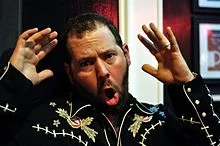
Bert Kreischer
Bert Kreischer (born November 3, 1972), nicknamed "The Machine", is an American stand-up comedian, podcaster, reality television host and actor. In 1997, he was featured in an article in Rolling Stone while attending Florida State University. The magazine named Kreischer "the top partyer at the Number One Party School in the country." The article also served as inspiration for the 2002 film National Lampoon's Van Wilder. Kreischer has served as host of the television series Hurt Bert on FX as well as Bert the Conqueror and Trip Flip on Travel Channel. He is slated to appear in The Machine, a comedy film based on his life.
Books Mentioned on The Joe Rogan Experience (JRE) #1954 - Joe Rogan & Bert Kreischer:
Exploring DMT Realms and Consciousness
Joe Rogan discusses the enigmatic nature of consciousness and the human brain’s ability to produce psychedelic chemicals that open “bizarre chemical doorways.” He references Graham Hancock’s work and the intriguing studies on the effects of slow-drip DMT experiences, which allow individuals to enter a repeatable environment and encounter entities. This research aims to map out a territory that many believe is accessed upon death, potentially offering a glimpse into the afterlife.
The Afterlife and Ancient Cultures
Rogan reflects on the beliefs of ancient cultures that consumed substances like Ayahuasca and mushrooms, which often spoke of encountering a realm or a “Well of Souls” inhabited by disembodied spirits. He discusses how these experiences and beliefs have been a staple of numerous religions, alluding to an afterlife that provides meaning beyond our temporary existence. This section delves into the human need for understanding and the idea that life extends beyond physical death.
Graham Hancock’s Contributions and Theories
Bert Kreischer mentions Graham Hancock’s significant contributions to understanding ancient civilizations and cosmic events. They discuss Hancock’s “Fingerprints of the Gods” and its theories, which were once ridiculed but have since gained credibility through new discoveries. This part of the article focuses on the collaboration between Hancock and Randall Carlson, their research on comet impacts, and how it ties into the rebirth of human civilization around 11,800 years ago.
Philosophical Musings on Existence
Rogan and Kreischer ponder the existential questions that arise from contemplating the afterlife and the nature of consciousness. They discuss the fear of non-existence versus the fear of eternal existence and the implications of living the same life repeatedly. This section reflects on the human condition, our fears, and the quest for understanding in a vast and complex universe.
Conclusion
“The Joe Rogan Experience #1954” offers a thought-provoking discussion that bridges the gap between ancient wisdom and modern science. Through their conversation, Rogan and Kreischer touch upon the profound mysteries of consciousness, the potential for an afterlife, and the enduring human quest for meaning. This article captures the essence of their exploration, inviting readers to consider the deeper aspects of existence and the possibilities that lie beyond our current understanding.
Joe Rogan on Will Smith’s Oscars Incident: A Deep Dive into Hollywood Culture
Joe Rogan, in episode #1954 of “The Joe Rogan Experience,” delves into the shocking moment Will Smith slapped Chris Rock at the Oscars, calling it the “biggest mistake of his life.” Rogan ponders the consequences of attacking one of the greatest stand-up comedians, emphasizing the foresight and wit Rock could and did employ in response. The incident isn’t just about the slap; it’s about the reaction, the immediate aftermath, and how Smith’s once sterling reputation took a hit overnight.
Hollywood’s Group Think
Rogan goes further to criticize the broader Hollywood culture, where independent thought is scarce, and groupthink prevails. He highlights the disconnection from reality, morals, and ethics within the industry, pointing out the bizarre standing ovation Smith received post-incident. This moment, according to Rogan, exemplifies the echo chamber of Hollywood, where actions are often disconnected from their moral implications.
The Role of the Internet
The discussion takes a turn to the role of the internet in shaping public opinion. While the Hollywood insiders might have their take, the internet represents the broader public view, which, in this case, was largely critical of Smith’s actions. Rogan and his guest, Bert Kreischer, discuss how online discourse often diverges significantly from the insulated views within the entertainment industry, offering a more unfiltered and varied perspective.
Conclusion
Joe Rogan’s conversation with Bert Kreischer on episode #1954 of “The Joe Rogan Experience” offers a raw and insightful look into the Will Smith Oscars incident and its broader implications. Rogan’s critique extends beyond the act itself, delving into the peculiarities of Hollywood culture and the powerful role of the internet in shaping public perception. The episode is a must-listen for anyone interested in the intersection of celebrity culture, media, and public opinion.





